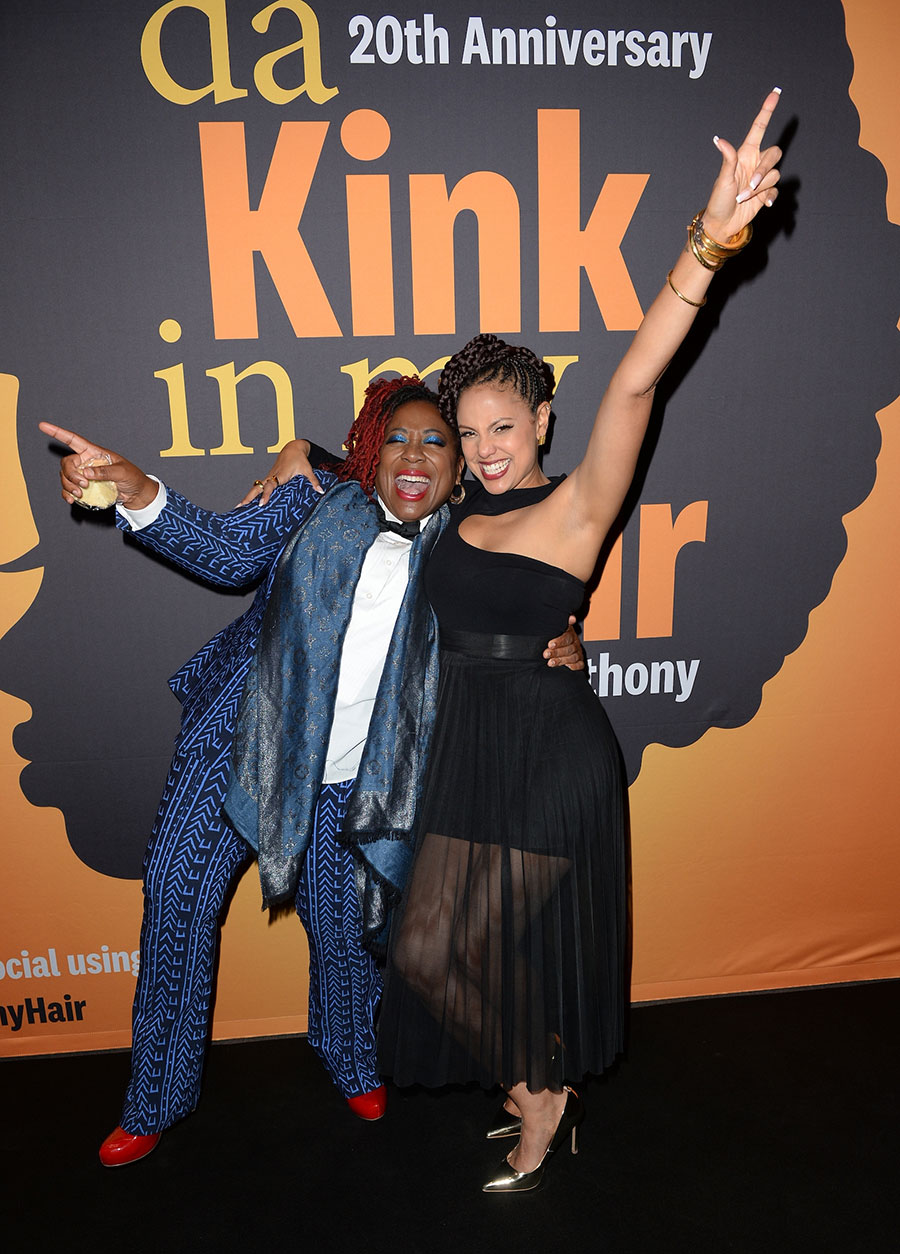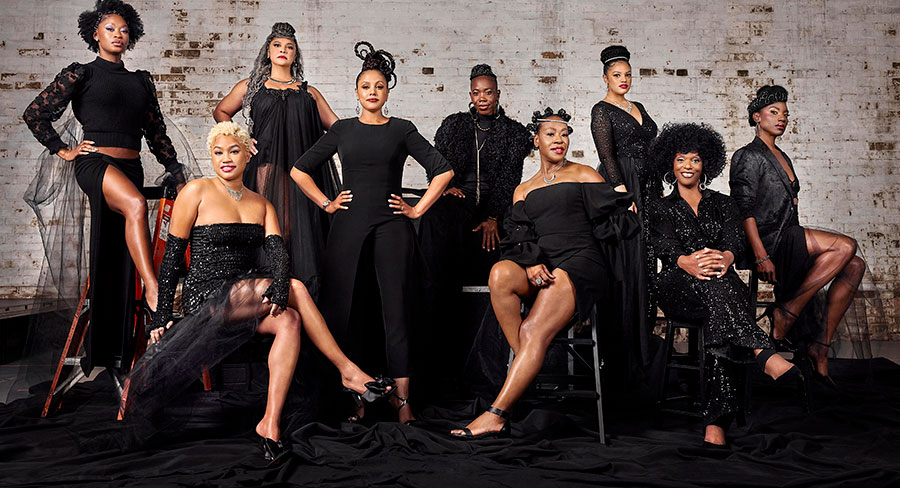‘da Kink in My Hair: Director Weyni Mengesha Discusses the Hit Play’s 20th Anniversary Run

Weyni Mengesha, who is also the artistic director of Soulpepper Theatre, enjoys a long history of working on 'da Kink in My Hair. Photo: Courtesy of Soulpepper
“Embrace the Kink,” as the Trey Anthony play ‘da Kink in My Hair concludes.
It’s a valuable message to Black women about the complex relationship they have with their hair, but also a critic’s view that the ongoing 20th anniversary production, directed by Weyni Mengesha and a co-production between TO Live and Soulpepper Theatre (for which Mengesha serves as artistic director), should be embraced and mounted again next year. Alas, it’s only on until Dec. 23 at Toronto’s Bluma Appel Theatre.
Anthony originally staged the music-infused comedy-drama at Toronto’s Fringe festival in 2001, which turned into a run at the Theatre Passe Muraille and a bigger production at the Princess of Wales Theatre in 2005 — for which Mengesha served as director and composer. It was also adapted into a TV movie (2004) and a sitcom (2007). And two decades later, much of the views, advice, trauma, stigma, defiance, values, support and community hold true in 2022.
Set in a hair salon owned by Novellette (Ordena Stephens-Thompson, reprising her role from the TV series), the local hub for Black women becomes a safe space for them to step forward and share their personal struggles and experiences. “If you want to know a Black woman, you touch her hair,” goes her now-famous line.
Zoomer spoke with Mengesha about directing the play nearly two decades ago and again today, and what’s next for the artistic director of Soulpepper Theatre.

KAREN BLISS: ‘da Kink in My Hair is a rare balance between comedy and poignancy, full of social and cultural issues addressed through the character’s dialogue and monologues. Twenty years later and everything from colourism to the murder of Black boys is still a part of it.
WEYNI MENGESHA: We didn’t change a word, unfortunately, even though it feels like it could have been written today.
KB: It’s not often a play requires a trigger warning at the beginning. Is that one of the main differences between staging ‘da Kink in My Hair now versus then — just the general awareness of how difficult topics can affect people?
WM: We definitely have grown as a society to understand how to prepare audiences better. When we first did this show 20 years ago, we had no precedent because we hadn’t seen stories like this about our community in a large-scale production like this. The Princess of Wales, when we did it, that was the very first Canadian play in there; forget about seven Black women talking about their stories.
KB: There were sounds of acknowledgement from the audience for certain issues that came up, particularly regarding comments Black girls and woman have heard all their lives from family, from men, from society, from media. But other issues in the play are universal. You’ve got aging, childhood molestation, sexuality, late-life pregnancy. Are any new to the 20th anniversary retelling?
WM: They all become new because there’s a different context, right. We definitely didn’t do this play, for example, on the heels of a global civil rights movement after the death of George Floyd. There’s a different kind of awareness and healing that is happening in the audience this time around.
KB: What were some of the discussions with Trey that that perhaps couldn’t be addressed 20 years ago and can now?
WM: For me, what was most important, as I said to Trey, “I really think we need to update the salon. It needs to be set now and not set then.” That was an interesting thing for us to try to figure out together because we wanted to make sure that it still held up. There were some tweaks, like the monologue around sexuality. It was part of Trey’s personal journey in the first place. And she said, “No, this doesn’t resonate with me in the same way now,” so she just spoke from her heart differently.
KB: The dialogue must have been tweaked very late in the game because you have the Kanye antisemitism reference.
WM: The one thing that makes a salon authentic is how current it is [Laughs]. You go there for your daily news and that’s what we’re talking about in the salons right now. There’s no question. The Kanye line came in maybe two weeks before we opened.
KB: How hard is that for you as a director dealing with the cast and telling them “We have to switch out this and add in this.”
WM: It’s not an average process. These artists are incredibly invested. It’s not just a gig. So they’re very involved and were really keen on us talking about some issues. So they were game. We would even workshop some ideas together. Every one of them feels like they’re doing a play, but they’re also having a real conversation with their city.

KB: Telling their story.
WM: Definitely.
KB: For any woman, no matter their skin colour and culture, ‘da Kink in My Hair is addressing self-esteem and society’s imposition of what beauty is and how that’s changed. In the play, there is chatter about how big lips and butts are in style now, but also about contouring the nose. What is the message to women?
WM: I heard recently that the BBL [Brazilian butt lift] was one of the most fatal surgeries that exists currently, and that’s alarming. It was important for us to talk about both. It is ironic to us that we grew up being made fun of for these attributes. And now, often white women are being featured with those same attributes. I remember it took JLo [Jennifer Lopez] to have to make the story around big booty. And Kim Kardashian. But then, at the same time, we also wanted to explore how standards of beauty are just hard to reach for every woman. There’s also issues around lightening skin and making sure that we contour. So it was important to have a conversation that invited everybody in to all of us reaching for these impossible standards.
KB: Yes, there is just so much food for thought in in the dialogue — everything from “how many Black boys need to die before they do something” to “Ladies, you’re never too old to find love” and we’re “too picky.” We hear that over and over again. What do you want audiences to take away at the end?
WM: To me, it’s a liberating piece. That’s what we hope for. As much as we’re talking about difficult things, we also build in moments of modelling healing and community, how we can come together, not just by telling our stories to our audience, which is our larger community, but we even model it onstage where we let people experience what it feels like for a community to heal each other. So as you see after Patsy’s monologue, there’s a community that comes together with the ritual and similarly with Stacey-Anne’s monologue. And that was really important to us that we actually can watch these women move through it with collective support.
KB: What’s next for you for 2023?
WM: We’re doing a concert called Billie, Sarah and Ella: Revolutionary Women in Jazz [Billie Holiday, Sarah Vaughan, and Ella Fitzgerald]. It’s written by Divine Brown [Soulpepper Slaight Music Associate]. Me and her are collaborating on this beautiful celebration of their contribution to jazz, both politically and musically, and their life stories and how they intertwined. Three wonderful artists playing the three different characters. We haven’t released that information yet, but Divine plays Billie. It’s going to be a wonderful time. That opens in February [Feb. 22-March 5].
For more information about ‘da Kink in My Hair, or to purchase tickets, click here.
RELATED:
Emancipation Day: Ngozi Paul Talks Art and the Fragility of Freedom Ahead of CBC Specials